

Columbia Pictures
Cast: Viola Dana (Molly Kelly), Ralph Graves (Andy Charles), Burr McIntosh (A.B. Charles), Aggie Herring (Maggie Kelly), Syd Crossley (Perkins, Andy's valet), Carl Gerard (Brooks, Mr. Charles' secretary)
Molly Kelly lives in a run-down apartment building with her mother
and two little brothers. She works at the cigar counter of a large
hotel where she hopes one day to meet a millionaire and marry
him. In a hurry after work one day, she runs out the door and
into Andy Charles, 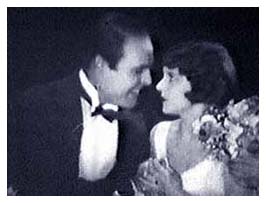 who, unknown to her, is the son of Restaurant
King A.B. Charles, Sr., a millionaire. She is rude to him, chastising
him for knocking her down, and hurriedly picks up her scattered
items from the sidewalk. As she returns them to her purse, she
unwittingly picks up Andy's wallet that has fallen from his pocket.
She leaves on the bus. Smitten, Andy follows her to return her
handkerchief. She continues to ignore him. However, as she's going
through her purse, she discovers the wallet. When she sees the
name "A.B. Charles" on the it, her attitude changes
quickly.
who, unknown to her, is the son of Restaurant
King A.B. Charles, Sr., a millionaire. She is rude to him, chastising
him for knocking her down, and hurriedly picks up her scattered
items from the sidewalk. As she returns them to her purse, she
unwittingly picks up Andy's wallet that has fallen from his pocket.
She leaves on the bus. Smitten, Andy follows her to return her
handkerchief. She continues to ignore him. However, as she's going
through her purse, she discovers the wallet. When she sees the
name "A.B. Charles" on the it, her attitude changes
quickly.
That night they go out on a date, and, on an impulse, Andy
asks her to marry him. They get married, and the next morning,
Molly wakes up in a hotel room to find Andy has gone on an early
morning shopping spree and brought back boxes and boxes of gifts
for her. In the midst of their happiness, A.B. Charles' secretary
arrives and tells Andy his father has disowned him for marrying
a "golddigger." Molly hears this from the other room,
and, brokenhearted, she leaves Andy a note saying he'd be better
off with her and goes home. Andy, however, goes after her, and
they decide to make it on their own without any help from Andy's
father. Andy proves totally unsuited for his first job on a construction
crew and gets fired. However, he hears the men complain about
the food in A.B. Charles' restaurant, but they raved over the
sandwich Molly brought him for lunch. He hits upon the idea of
selling box lunches to workers in the city, and soon they have
a thriving business. Things get interesting, however, when A.B.
Charles learns that 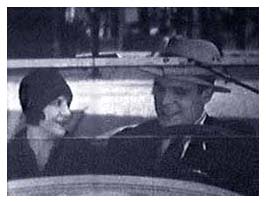 this new box lunch company (he doesn't
know it is owned by his son) is cutting his restaurant profits
in half!
this new box lunch company (he doesn't
know it is owned by his son) is cutting his restaurant profits
in half!
"That Certain Thing" (1928) was Frank Capra's first directorial effort after leaving the employment of Harry Langdon. He went back to Mack Sennett as a gag man for awhile when he got a call to go to Columbia Pictures, at that time a "poverty row" studio. According to Capra's biography (The Name Above the Title: An Autobiography, Macmillan Company, 1971), he was hired by Columbia to direct and then asked to come up with a story. In his account of his meeting with studio head Harry Cohn, Capra says he demanded total control of this first picture -- writing, editing and directing -- or he would "walk out." Cohn, who was considered brusque, irreverent and abrasive in his dealings, reluctantly agreed to consider it after hearing the story idea. Capra laid out the plot of "That Certain Thing," and, according to Capra, Cohn was excited about the story. Capra asked for Ralph Graves, whom he had known at the Sennett studio, for the male lead. Capra didn't have a suggestion for the female lead, but Cohn did -- Viola Dana. According to Capra, Cohn said, "I got just the dame," and, to convince Capra, added that she was "sexy" and could "wiggle her a--."
Capra said the movie was made on a budget of $20,000, less
than Mack Sennett would spend on a two-reeler in those days. "The
shooting of 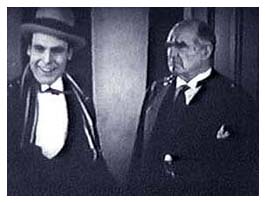 'That Certain Thing' was a postgraduate course in penny-pinching.
Not a moment was wasted, not a nickel. We even saved lunch money
on location by eating our own props -- the box lunches."
Reportedly, Cohn was so pleased with the finished picture that
he offered Capra a deal for two more pictures at $25,000 each.
'That Certain Thing' was a postgraduate course in penny-pinching.
Not a moment was wasted, not a nickel. We even saved lunch money
on location by eating our own props -- the box lunches."
Reportedly, Cohn was so pleased with the finished picture that
he offered Capra a deal for two more pictures at $25,000 each.
Capra's reputation as a director is well-known with such hits as ""It Happened one Night" (1934), "Lost Horizon" (1937), "Mr. Smith Goes to Washington" (1939), "Meet John Doe" (1941) and "It's a Wonderful Life" (1946). Also, quite a bit has been written (and debated) about his association with Harry Langdon and his contribution to that comedian's success. However, outside of the Langdon films, the only silent that seems to have received any recognition in recent years is "The Matinee Idol" (1928) with Bessie Love. However, "That Certain Thing" is available on video, but not the quality that we would like it to be. The story is charming, and Viola Dana and Ralph Graves prove to be an excellent team.
Certainly there's nothing original about the story, but
that's all the more credit to Capra that he makes something genuine,
touching and humorous out of it. We have the working girl, Molly,
who is dreaming of meeting and marrying a millionaire one day
(sounds similar to Colleen Moore's "Orchids and Ermine"
made just one year earlier, doesn't it?). They meet and marry
in a matter of hours. All is very light and frivolous up to this
point, Then, the next morning, when Molly is being showered with
gifts at the hotel by her new husband and, no doubt, dreaming
about her life as the wife of a millionaire, the dream comes crashing
down. Her father-in-law has sent word that he is disowning his
son for marrying a golddigger and cutting off his money. All the
gifts must be 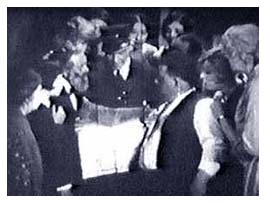 returned.
returned.
The scene tugs at the heartstrings even more when Molly overhears her father-in-law's secretary tell her husband that everything will be all right if he'll leave his new wife. For her husband's sake, she slips away and returns home. At this point, Capra makes "The Certain Thing" a little more than the run-of-the-mill programmer. Everyone in her apartment building has been depicted as a "busy body." They all, to Molly's delight, gawked from the windows and balconies when Andy came to pick her up the night before. The next day, they all gathered together to read the news about Molly's marriage in the morning paper. However, when Molly returns home, Capra has her walking down the dirty street of her neighborhood, at night, in the pouring rain, with her hair and her borrowed dress completely soaked. And, when she returns to the apartment building, everyone is out to see her -- not comfort her, mind you -- but to taunt her at her misfortune. Her long time suitor, a big, ugly guy who is a conductor, smirks as the crowd makes rude remarks. Finally, Molly gets into her apartment, and her mother runs the lot of them away with a rolling pin. The ones who loaned Molly the dress, stockings and other things for her big date, take the wet items back angrily, and we see Molly, in her robe, crying on the bed. Good, emotionally charged stuff -- apparently the beginnings of the famous "Capra touch."
Without giving away the ending, it is handled deftly with
a neatly packaged conclusion that satisfies and leaves one with
a good feeling. Needless to say, the young couple do make it on
their own, and, of course, Andy must be reunited with his father,
which Carpra resolves 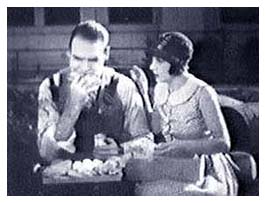 skillfully.
skillfully.
Viola Dana was a long-time movie veteran by the time "That Certain Thing" was made in 1928. She started her career at the tender age of 13 in 1910 with the Edison company. She was a very popular star, although there are no major films or really outstanding roles to her credit. "Merton of the Movies" (1924) was a big hit, and "Open All Night" (1924) is one of only a few available on video, and, fortunately, it's an excellent comedy co-starring Adolphe Menjou. Dana's future husband Lefty Flynn and Raymond Griffith in a hilarious role that tops off the picture. By the time she made "That Certain Thing," her career was on the wane, and she chose to retire rather than contend with talkies. At least three of her early dramatic roles, directed by then-husband John Collins, exist. They are "Blue Jeans" (1918), "The Cossack Whip" (1917) and "Children of Eve" (1915). All three are in archives, however, and are not available on video at the time of this writing. She lived comfortably until her death in 1987.
"That Certain Thing" was one of five features
in which Capra starred Ralph Graves. He made his first appearance
on screen in 1918 and was signed by D.W. Griffith in 1919 appearing
in "Scarlet Days" (1919), "The Greatest Question"
(1919) and "Dream Street" (1921). Like Dana, he has
no really memorable roles, but did work for Mack Sennett from
1923 to 1926 co-starring with Mabel Normand in "The Extra
Girl." He did some directing in the late 1920's, and, during
the 1930's was an assistant to Irving Thalberg at MGM. He also
continued acting 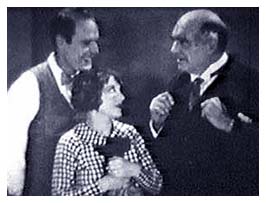 through the forties and retired comfortably
until his death in 1977.
through the forties and retired comfortably
until his death in 1977.
Dana and Graves are well cast in "That Certain Thing" and seem to play well off each other, enjoying their roles and showing it. Dana is perky enough to bring some liveliness to her roles, and her screen presence is well-suited for silent movies with expression and the ability to go from humor to sympathy. Although less range is required of Graves, his broad smile, large stature (compared to Dana's petite frame), and good looks make him the perfect leading man. He plays the spoiled rich guy's kid without being obnoxious about it, and that helps us believe his sincerity in marrying Molly and proving his love by defying his father.
Burr McIntosh is also a perfect casting as the stern, no-nonsense A.B. Charles, Sr. He is best remembered as Richard Barthelmess' father in "Way Down East" (1920), and everyone certainly remembers the famous still of McIntosh pointing to the door as a pitiful Lillian Gish, head down, is sent out into the snow.
"That Certain Thing" is a neatly-packaged, highly enjoyable film. However, as noted, the quality of the surviving print of this movie is only average -- pretty good contrast, a little grainy and some lines, -- but don't let that deter you from watching this movie. Jack Hardy has just upgraded Grapevine Video's copy, which has an appropriate piano score. It is the best print available and highly recommended for an enjoyable 75 minutes.
copyright 2003 by Tim Lussier,
all rights reserved